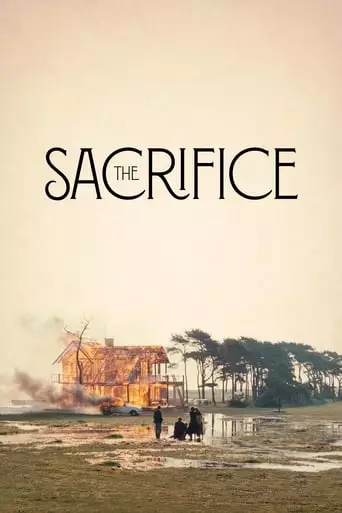Alexander, a journalist, philosopher and retired actor, celebrates a birthday with friends and family when it is announced that nuclear war has begun.
The Sacrifice is the final film by the Russian director Andrei Tarkovsky, released in 1986 as he grappled with terminal cancer. Set on the Swedish island of Gotland, it centers on Alexander, an aging intellectual who is deeply disillusioned with the modern world. On his birthday, the news arrives that World War III has begun, leading to a global crisis. This sets the stage for Alexander’s desperate attempt to prevent the apocalypse.
In the midst of this crisis, Alexander makes a profound decision: he will sacrifice himself to save the world and his family. This act, driven by a combination of guilt, love, and a desire for redemption, leads him to beg for divine intervention. He offers his life, in a desperate and deeply symbolic act of personal sacrifice. As the story unfolds, Alexander’s journey is portrayed through Tarkovsky’s signature slow, contemplative shots, creating an atmosphere of existential tension and deep reflection. The film concludes with a dramatic, symbolic gesture—Alexander setting fire to his house as a final act of renunciation and purification.
Analysis and Themes
The Sacrifice delves into several complex themes, exploring the nature of personal sacrifice, the end of the world, and the search for meaning in the face of impending disaster.
- The End of the World: The film presents a world teetering on the brink of self-destruction. Through Alexander’s crisis, Tarkovsky addresses the anxieties of the Cold War era, where the specter of nuclear war loomed large. The impending apocalypse in the film is not just a physical event but a spiritual one, calling into question the purpose and value of human existence.
- Sacrifice and Redemption: Alexander’s ultimate act of sacrifice is the film’s central theme. It is not just a literal offering of his life but a metaphorical and philosophical gesture, questioning the limits of individual responsibility. His willingness to give up everything—his possessions, his family’s future, and his life itself—embodies the idea of redemption through personal sacrifice. Tarkovsky draws on both Christian and pagan imagery, suggesting that the concept of sacrifice is universal and timeless.
- Solitude and Reflection: Tarkovsky’s use of long, meditative takes creates an atmosphere of solitude. The characters often appear isolated, either physically or emotionally. Alexander’s monologues about the state of the world are a reflection of his internal struggles, and the film becomes an exploration of his personal journey towards spiritual clarity, even as the external world disintegrates.
- Time and Memory: Time is a crucial element in The Sacrifice. Tarkovsky’s long takes invite viewers to consider the passage of time not as a mere technical device but as an emotional experience. The slow unfolding of events encourages contemplation, forcing the audience to reflect on the fleeting nature of life and the legacy one leaves behind.
- Artistic Creation and Destruction: The motif of creation and destruction is symbolized through the burning of Alexander’s house, which is both a literal and metaphorical act of purification. Tarkovsky’s choice to film this scene with one camera and in a single take emphasizes the fragility of existence and the fleeting nature of artistic and personal achievements.
10 Reasons to Watch The Sacrifice
- A Masterpiece by Andrei Tarkovsky: As Tarkovsky’s final film, The Sacrifice encapsulates his unique cinematic vision and offers a profound meditation on human existence.
- Explores Deep Philosophical Themes: The film grapples with complex issues like sacrifice, redemption, and the search for meaning in the face of catastrophe, providing ample material for thought and discussion.
- Visually Stunning Cinematography: The film’s long, contemplative shots and its careful composition, led by cinematographer Sven Nykvist, make The Sacrifice visually striking and aesthetically unforgettable.
- Existential Reflection: If you’re interested in films that provoke deep existential questions, The Sacrifice will challenge your thoughts on life, death, and the human condition.
- Emotional Power: The film’s slow build-up and intense final moments offer a profound emotional experience that lingers long after the credits roll.
- A Unique Approach to Apocalyptic Cinema: Unlike most films that deal with the apocalypse, The Sacrifice doesn’t rely on violence or spectacle but on personal, philosophical reflections, making it a thought-provoking take on the genre.
- Intimate, Thoughtful Performances: Erland Josephson’s portrayal of Alexander is both fragile and powerful, bringing depth to the character’s internal conflict.
- Tarkovsky’s Final Testament: The film serves as a powerful statement from one of cinema’s most enigmatic directors, making it a must-watch for fans of his work.
- A Cinematic Journey: The Sacrifice is a slow, meditative film that offers a journey rather than a plot-driven narrative. It’s for viewers who appreciate thoughtful, non-conventional storytelling.
- A Lasting Legacy: Tarkovsky’s exploration of spirituality, self-destruction, and redemption offers a timeless meditation that resonates with contemporary global concerns, making it relevant even decades after its release.
How Will You Feel After Watching The Sacrifice?
After watching The Sacrifice, you may experience a range of emotions, from sadness to contemplation. The film’s slow pace and philosophical depth can evoke feelings of isolation and melancholy, as Tarkovsky’s meditative approach forces you to engage deeply with existential questions. The emotional intensity of Alexander’s sacrifice, coupled with the film’s haunting final moments, may leave you with a lingering sense of awe and introspection. You might feel the weight of the film’s themes long after it ends, contemplating the value of personal sacrifice and the impact of individual choices on the greater good. Ultimately, The Sacrifice is not a film meant to entertain in the conventional sense but to provoke deep thought and reflection on life, love, and the possibility of redemption in an often harsh world.

